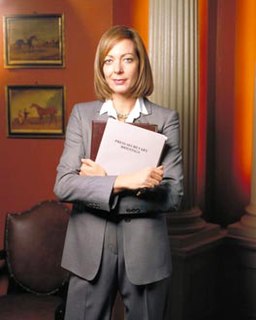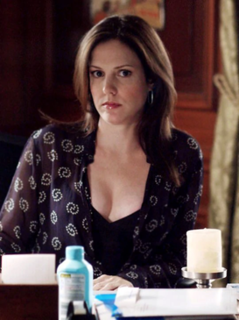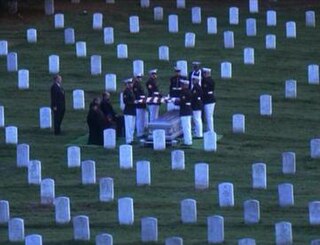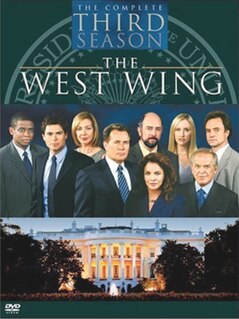
The West Wing is an American serial political drama television series created by Aaron Sorkin that was originally broadcast on NBC from September 22, 1999, to May 14, 2006. The series is set primarily in the West Wing of the White House, where the Oval Office and offices of presidential senior personnel are located, during the fictitious Democratic administration of President Josiah Bartlet.

Josiah Edward "Jed" Bartlet is a fictional character from the American television serial drama The West Wing created by Aaron Sorkin and portrayed by actor Martin Sheen. The role earned Sheen a Golden Globe Award for Best Actor – Television Series Drama in 2001, as well as two SAG Awards.

William Garrett Walden, known as W. G. Snuffy Walden, is an American musician and composer of film and television soundtracks. Walden is an Emmy Award winner for the theme music to The West Wing (NBC), has been nominated for numerous Emmys throughout his career, and has received 26 BMI Awards.

Joshua Lyman is a fictional character played by Bradley Whitford on the television drama series The West Wing. The role earned Whitford the Primetime Emmy Award for Outstanding Supporting Actor in a Drama Series in 2001. For the majority of the series, he is White House Deputy Chief of Staff and Chief Political Advisor in the Josiah Bartlet administration.

Claudia Jean Cregg is a fictional character played by Allison Janney on the American television drama The West Wing. From the beginning of the series in 1999 until the sixth season in 2004, she is White House press secretary in the administration of President Josiah Bartlet. After that, she serves as the president's chief of staff until the end of the show in 2006. The character is partially inspired by real-life White House Press Secretary Dee Dee Myers, who worked as a consultant on the show.

Charles Young is a fictional character played by Dulé Hill on the television serial drama The West Wing. For the majority of the series, he is the Personal Aide to President Josiah Bartlet.

Fanfare for the Common Man is a musical work by the American composer Aaron Copland. It was written in 1942 for the Cincinnati Symphony Orchestra under conductor Eugene Goossens and was inspired in part by a speech made earlier that year by then American Vice President Henry A. Wallace, in which Wallace proclaimed the dawning of the "Century of the Common Man".

Amelia Gardner is a fictional character portrayed by Mary-Louise Parker on The West Wing, an American serial political drama. Created in the show's third season after a voicemail from Parker to the show's creator, Amy serves as both a feminist viewpoint on the show and a love interest for Josh Lyman. While critics generally approved of her feminist ideals, they were split on whether her romance with Josh was better or worse than his relationship with his former assistant, Donna Moss.

Ainsley Hayes is a fictional character played by Emily Procter on The West Wing, an American serial political drama. Primarily appearing in the second and third seasons for a total of twelve episodes, Ainsley served as the Associate White House Counsel under the show's president, Josiah Bartlet. Reception for Ainsley has ranged from mixed to positive; she is characterized as smart and flirtatious, but also vulnerable to sexism from other characters and the show's writing.

"In Excelsis Deo" is the tenth episode of the first season of The West Wing. It originally aired on NBC on December 15, 1999, as the show's Christmas special. Events circle around Toby Ziegler getting involved in the fate of a dead Korean War veteran, reactions to a severe hate crime, and the ongoing controversy surrounding Leo's past alcohol and prescription drug abuse. Written by Aaron Sorkin and Rick Cleveland and directed by Alex Graves, the episode contains guest appearances by Paul Austin and Raynor Scheine. It also earned Sorkin and Cleveland the Primetime Emmy Award for Outstanding Writing for a Drama Series, as well as one for Richard Schiff.
"Let Bartlet Be Bartlet" is the 19th episode of The West Wing and first aired on NBC on April 26, 2000. In the episode, a White House insider writes a memo that attacks President Bartlet for his ineffectiveness in making bold decisions due to his timid nature.
"Two Cathedrals" is the 44th episode and second season finale of The West Wing. It was first broadcast on May 16, 2001.

The first season of the American political drama television series The West Wing aired in the United States on NBC from September 22, 1999 to May 17, 2000 and consisted of 22 episodes.

The second season of the American political drama television series The West Wing aired in the United States on NBC from October 4, 2000 to May 16, 2001 and consisted of 22 episodes.

The third season of the American political drama television series The West Wing aired in the United States on NBC from October 3, 2001 to May 22, 2002 and consisted of 21 episodes and 2 special episodes.

The fourth season of the American political drama television series The West Wing aired in the United States on NBC from September 25, 2002 to May 14, 2003 and consisted of 23 episodes.
"A Proportional Response" is the third episode of the first season of The West Wing, an American serial television drama. The episode centers around the continuation of a storyline introduced in the previous episode, in which a plane carrying a new friend of President Bartlet was attacked by the Syrian government. The episode also sees the introduction of Dulé Hill as Charlie Young, and an argument between C. J. Cregg and Sam Seaborn over Sam's decision to befriend a call girl.

The West Wing Weekly is an American podcast hosted by Hrishikesh Hirway and Joshua Malina. In each episode, the hosts discuss one episode of the television program The West Wing, which originally aired on NBC from 1999 to 2006. The podcast, which ran from 2016–2020, features various cast and crew members including series creator Aaron Sorkin, director Tommy Schlamme, series actors Martin Sheen, Rob Lowe, Bradley Whitford, Richard Schiff, Allison Janney, Janel Moloney, Marlee Matlin, and Dulé Hill, longtime series writer-producers Eli Attie and Lawrence O'Donnell, and many former government officials, academics, and pundits, among others.

Up to Snuff is a 2018 documentary film about musician and composer W. G. Snuffy Walden, written, directed and produced by Mark Maxey, produced and edited by Gino Scofidio.
"A West Wing Special to Benefit When We All Vote" is a special reunion episode of the television series The West Wing. The episode was a recreation of the season 3 episode "Hartsfield's Landing", shot at the Orpheum Theatre in Los Angeles, California. It was released on October 15, 2020, on HBO Max.
















